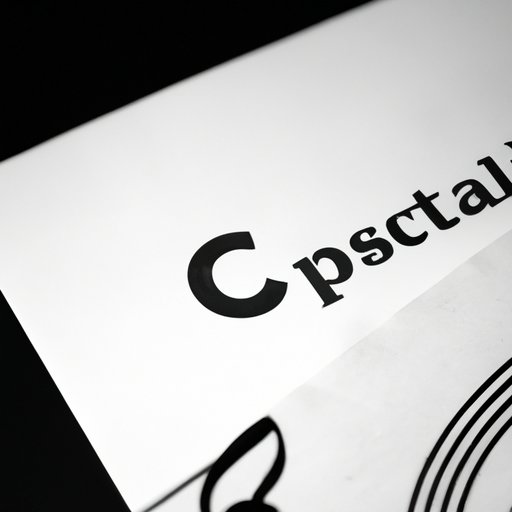
Introduction
As a songwriter, you’ve poured your heart and soul into your music. Naturally, you want to protect your creative work from theft or misuse. Copyrighting your song is a crucial step in safeguarding your music and ensuring that you receive recognition and compensation for your efforts.
Why Copyrighting Your Song is Crucial: Understanding the Basics
Before we dive into the step-by-step guide to copyrighting your song, let’s take a moment to understand why copyrighting is crucial. With the digital age enabling easy sharing and piracy, protecting your music will safeguard your rights and ensure that you receive credit where it is due.
Piracy represents a significant threat to your work. Unauthorized use of your music can lead to lost revenue and decreased recognition, not to mention the possibility of legal action. On the other hand, copyrighting your work offers numerous benefits and helps you establish ownership over your creative endeavours.
A Step-by-Step Guide to Copyrighting Your Song: Everything You Need to Know
Here’s a comprehensive and easy-to-follow guide to copyrighting a song:
Step 1: Create and fix your work in a tangible form
Before you proceed with copyrighting your song, make sure that your creation exists in a tangible form. This can be in the form of a recording, written score, or lyrics. Having a physical copy of your work is essential for registration purposes and is a necessary first step in the process.
Step 2: Register your work with the U.S. Copyright Office
Registering your work with the U.S. Copyright Office is a crucial part of protecting your intellectual property. To register your song, you can either use the online registration system or mail in a physical application.
When registering online, you’ll need to complete an application, pay a fee, upload a digital copy of your work, and submit your application. You can expect to receive confirmation, along with a certificate of registration, in a matter of months.
Step 3: Review your certificate of registration
Once your registration is confirmed, review your certificate of registration to confirm that all the information is accurate and up-to-date.
Step 4: Police your copyright
Monitoring your copyright is a critical component of safeguarding your creative work. You must be diligent in identifying any instances of unauthorized use or infringement, taking any necessary legal action to protect your intellectual property rights.
Tips for a smoother experience
Here are a few tips that can help you through the process of copyrighting your song:
- Ensure that you have all the necessary documentation and proof of ownership before proceeding with registration.
- Use the online registration system as it is more efficient and less time-consuming.
- Keep accurate records of your copyright ownership, including the date of creation, registration, and any changes made to your work.
Expert Advice on Copyrighting Your Song: Insider Tips from Experienced Musicians
To provide you with more insights into the process of protecting your music, we’ve gathered some advice from experienced musicians who have gone through the process before:
According to music producer, Trevor Horn, “Registering your music is essential. Not only does it protect your work, but it also ensures you get paid when your music is used.” Musician, Nile Rodgers, adds, “Copyrighting your music is a sign of professionalism. It shows that you are serious about your craft and that you value your creations.”
From the experiences of these musicians, it is evident that registering your work is an essential part of safeguarding your creative endeavors.
Going Solo: A Comprehensive Guide to Copyrighting Your Written and Recorded Music
For solo artists, the process of copyrighting music may seem overwhelming. However, the steps remain the same, whether you are a solo artist or part of a band. The only difference lies in the ownership of the music.
If you’re a solo musician and you’ve written and performed your own music, there’s no need to worry. The copyright for the song belongs solely to you.
When registering a recorded song, you’ll need to obtain both the sound recording copyright and the song copyright. The song copyright refers to the lyrics and melody, while the sound recording copyright refers to the recording itself.
Copyrighting Your Music: How to Protect Your Creative Work in a Digital Era
In today’s digital age, creative artists face numerous challenges, including online sharing and piracy. As a songwriter, it’s crucial to take measures to protect your music in the digital era.
One way to safeguard your creative work is through the use of digital protection measures, such as digital watermarks. Digital watermarks make it easy to monitor unauthorized use of your music and take action if necessary.
Top Tools and Resources for Copyrighting Your Song in 2021: Your Complete Guide
To make the process of registering a song easier and more efficient, there are many tools and resources available to songwriters in 2021. Some of these resources include:
- Copyright registration services
- Lawyers and legal services specializing in copyright law
- Online communities and forums for creatives to share knowledge and experiences
Using these tools and resources will enable you to register your work more efficiently, protect your intellectual property rights and establish a solid foundation for your creative endeavors.
Conclusion
In conclusion, copyrighting your song is an essential step in safeguarding your creative work and ensuring that you receive recognition and compensation for your efforts. By following the steps outlined in this article and utilizing the tools and resources available, you can protect your music from theft and misuse, establishing ownership over your creative endeavors.





